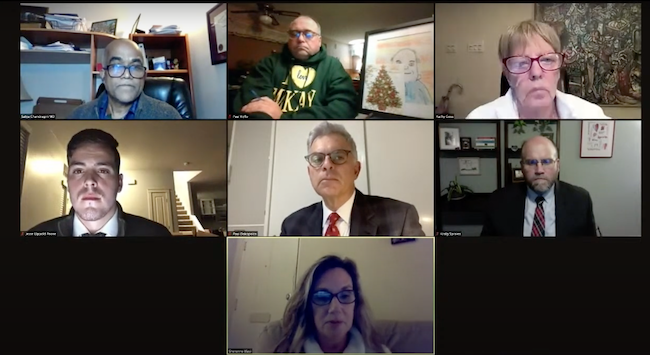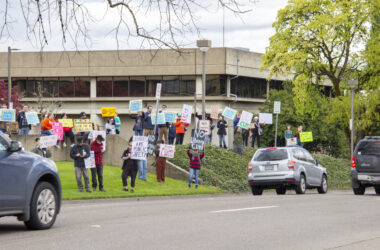 School board members discuss the comment policy during a Dec. 8 meeting (Screenshot from YouTube)
School board members discuss the comment policy during a Dec. 8 meeting (Screenshot from YouTube)
After facing months of criticism over their handling of racial justice issues, the Salem-Keizer School Board narrowly voted to rein in public comment Tuesday night.
The policy, approved on a 4-3 vote, is intended to bring more civil discourse to board meetings that have sometimes turned heated over discussions about police in schools and board members’ comments in response to community concerns, board leaders said.
It would allow the board chair to cut off comments that are “obscene, derogatory, name-calling, racist, threatening” or criticize district employees by name.
It drew staunch opposition from frequent public commenters both at Tuesday’s meeting and board meetings earlier this fall, when it was first proposed.
Before voting in favor, board Chair Satya Chandragiri compared running board meetings to being a victim of domestic violence.
“I felt like I was walking into a domestic violence relationship every time I sit in this board meeting,” Chandragiri said. “It was like walking on eggshells. Our ability to bring up or even entertain an alternative point of view was completely stifled.”
Board members Sheronne Blasi and Jesse Lippold pushed back. Blasi said it was “appalling” to compare receiving sustained criticism as an elected official to domestic violence.
“It just reinforces the community’s concern that the board is not listening,” she said of the policy.
Lippold and Blasi voted against the change and were joined by Paul Kyllo, who said the board chair has the ability under existing policy to limit public comment.
Board members Danielle Bethell, Kathy Goss and Marty Heyen joined Chandragiri in voting for it.
They said the policy would not lead to commenters getting cut off for simply criticizing board members and is instead meant to prevent personal attacks.
“We’re human beings with feelings. We’re here to serve. But there’s no reason to be mean, there just isn’t,” Heyen said.
Chandragiri first proposed the comment policy in October after he and other board members raised concerns that critical comments, often from members of Latinos Unidos Siempre, were too often becoming personal.
Student members and supporters of Latinos Unidos Siempre have advocated for the board to remove all police officers from local schools since the summer. They have also called on several members of the board to resign over issues including an incident where Kyllo wore a cutout of former TrailBlazer Cliff Robinson’s face during a virtual meeting in March. Kyllo’s stunt was likened to appearing in blackface.
Their comments frequently called individual board members and the board as a whole racist and white supremacist for their lack of action.
The police in schools issue remains unresolved. District leaders on Tuesday proposed a series of community forums and listening sessions over the coming months to develop a plan for revamping the district’s school safety and discipline system, of which police officers are just one part.
On their Facebook page, Latinos Unidos Siempre urged residents to call in and object to the proposal by delivering testimony in the form of poetry. About a dozen obliged, many saying the comment policy amounted to another effort to silence criticism.
“They say silence is violence, well now you’re violently silencing us,” said Salem resident Brett Stoner-Osborne, calling the proposal “inherently abhorrent and undemocratic.”
Oregon law does not require school boards to take public comment during meetings, though the Oregon School Boards Association encourages boards to provide opportunities for input. Their guidance suggests limiting comments to three minutes, something the Salem-Keizer board already does.
Paul Dakopolos, the district’s attorney, told board members the policy could present legal issues if board members are perceived as cutting off comments because they disagree with the content.
“Applying this policy consistently will be a chore. You’ll need to apply it consistently because if you don’t, the claim will be that you’re censoring the message — messages you like versus messages you don’t like. That’s what the community is saying,” he said.
Contact reporter Rachel Alexander: [email protected] or 503-575-1241.
HOLIDAY SPECIAL: SAVE 25% off a one-year subscription to Salem Reporter. Get quality Salem news delivered to your inbox. Every subscription helps build coverage of the Salem community. Order online HERE.

Rachel Alexander is Salem Reporter’s managing editor. She joined Salem Reporter when it was founded in 2018 and covers city news, education, nonprofits and a little bit of everything else. She’s been a journalist in Oregon and Washington for a decade. Outside of work, she’s a skater and board member with Salem’s Cherry City Roller Derby and can often be found with her nose buried in a book.









